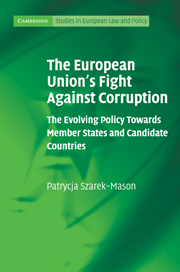 The European Union's Fight Against Corruption
The European Union's Fight Against Corruption Book contents
- Frontmatter
- Contents
- Table of cases
- Acronyms and abbreviations
- List of tables and figures
- Introduction
- 1 Corruption: concept, importance and international response
- 2 The scope of EU legal powers and development of the policy in the area of anti-corruption
- 3 The EU strategy against corruption within the Member States
- 4 Conditionality in the EU accession process
- 5 The EU's evaluation of corruption in the Central and Eastern European candidate countries
- 6 The EU anti-corruption strategy towards the Central and Eastern European candidate countries: achievement or missed opportunity?
- 7 The impact of 2004 enlargement on the EU anti-corruption policy
- 8 Conclusion
- List of interviews and consultations
- Appendix 1
- Appendix 2
- Bibliography
- Index
- CAMBRIDGE STUDIES IN EUROPEAN LAW AND POLICY
Introduction
Published online by Cambridge University Press: 03 May 2010
- Frontmatter
- Contents
- Table of cases
- Acronyms and abbreviations
- List of tables and figures
- Introduction
- 1 Corruption: concept, importance and international response
- 2 The scope of EU legal powers and development of the policy in the area of anti-corruption
- 3 The EU strategy against corruption within the Member States
- 4 Conditionality in the EU accession process
- 5 The EU's evaluation of corruption in the Central and Eastern European candidate countries
- 6 The EU anti-corruption strategy towards the Central and Eastern European candidate countries: achievement or missed opportunity?
- 7 The impact of 2004 enlargement on the EU anti-corruption policy
- 8 Conclusion
- List of interviews and consultations
- Appendix 1
- Appendix 2
- Bibliography
- Index
- CAMBRIDGE STUDIES IN EUROPEAN LAW AND POLICY
Summary
Since the end of communism in Central and Eastern Europe, corruption has emerged as a major political issue and a serious impediment to efforts for social and economic development in the region. As a result of the biggest enlargement process in European Union (EU) history, eight post-communist countries (the Czech Republic, Estonia, Hungary, Latvia, Lithuania, Poland, Slovakia and Slovenia) joined the EU in 2004.
The pre-accession process coincided with the collapse of communism and the EU was in a unique position to guide the Central and Eastern European (CEE) countries in their democratic and economic transitions. Combating corruption gained unprecedented importance during this process. It was recognised as a central element of democratic governance and the rule of law and became an explicit condition for EU membership. Throughout the pre-accession period, the EU attempted to tackle the issue of corruption in the CEE countries. The EU influenced their national anti-corruption policies and demanded reforms from the candidate countries in a way that had never occurred within the EU Member States.
This book does not offer a systematic treatment of the causes of the phenomenon of corruption or its principal characteristics. Therefore, there is also no significant analysis of the capacity of legal regulation to penetrate this phenomenon and bring about effective change. Instead, the book focuses on the EU anti-corruption policy in the specific context of the 2004 enlargement. In particular, it answers three important questions: what is the policy of the EU against corruption within the CEE countries after accession? Is this policy enough to address the problem of corruption across the Member States? And, if not, should the EU develop a more comprehensive framework?
- Type
- Chapter
- Information
- The European Union's Fight Against CorruptionThe Evolving Policy Towards Member States and Candidate Countries, pp. 1 - 4Publisher: Cambridge University PressPrint publication year: 2010
